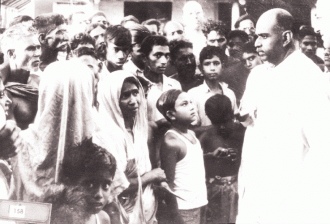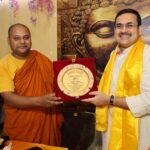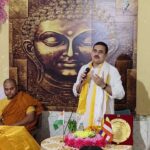ARTICULATING THE TRUTHS OF HISTORY
- By : Anirban Ganguly
- Category : Articles

On Syama Prasad Mookerjee’s 115th birth anniversary, it’s time people get over their ignorance, and communicate, without fear, certain historical truths about him that have been subverted by both British colonialists and communist historians
In 1944, Syama Prasad Mookerjee, in collaboration with the legendary Ram Nath Goenka, founded the English daily The Nationalist— a daily that would be “fully nationalist” and “thoroughly independent”. Mookerjee wrote to Vinayak Damodar Savarkar, informing him of the effort and sought his contributions in terms of articles and thoughts. In his letter to Mookerjee, dated October 25, 1944, Savarkar talked of the need for a “genuine nationalism that takes its stand on the equality all citizens irrespective of caste or creed…” Such letters are never cited especially in case of nationalist like Savarkar or Mookerjee, because it hammers away at false stereotypes framed and popularised, over the years, by an interested section.
The Nationalist, in its brief life eventually earned the wrath of the colonial administration with Wavell complaining of the “consistently anti-British, anti-Allies nature of its articles.” In fact, Mookerjee’s persistently anti-colonial attitude led him to be excluded from the Simla talks in 1945. It was clear, as one of Mookerjee’s biographer notes, “that exclusion of Mookerjee and the Hindu Mahasabha from the Simla Conference was really due to two reasons — Mookerjee’s view on the structure of the new Constitution which was not acceptable to Jinnah and his “anti-British and anti-allies” attitude.”
This reality has been skillfully obfuscated or subverted by intellectuals who are essentially apologists for communist collaborators of the British. The lamentable reality of our times is that some of these apologists and relics of communism in India have called Mookerjee a collaborator of the Muslim League without even possessing an elementary modicum of knowledge of the history of that period. Of late, a certain portal — let me not dignify it by naming it — run essentially by a group whose members have earned distinction by pilfering money they had collected in the name of providing relief to victims of the Gujarat riots of 2002, has suddenly taken interest in Mookerjee and hired a mercenary intellectual to conduct a hit-job on his persona. The modus operandi of this group, whether in Gujarat against Modi-Shah or now in attacking Mookerjee’s legacy, has always been to use a network of mercenary pseudo-intellectuals who base themselves on half-truths and fantasies and eventually dish out a most atrocious broth of propaganda laced lies.
To call a leader who, alongwith Sarat Chandra Bose, firmed up the first Hindu-Muslim coalition cabinet sans the League in Bengal and managed to successfully sideline Jinnah’s politics in that Province for a while, to call one who deftly and resolutely opposed and organised opposition to the Muslim League’s highly communal Bengal Secondary Education Bill which aimed to communalise education in the Province as a collaborator of the Muslim League, is either a sign of an increasing mental dementia or the result of a deep depression induced by the realisation of a growing academic and political irrelevance.
In fact Mookerjee decided, in the wider interest of Bengal and of India, to keep the Muslim League out of power in the Province. When the Congress refused to align itself with Fazlul Haq, it lost an opportunity to marginalise the League. Mookerjee unwilling to let the opportunity slip away worked to bring “all the non-Congress Hindu forces together in the legislature to form the Progressive Democratic Coalition” with Haq. By then, Haq’s dalliance with the League had ended because he realised how Jinnah had used him, betrayed him and marginalised him by virtually decimating his party.
The ‘Syama-Haq’ coalition, as it popularly came to be called, was an eye sore both for the British and the Leaguers and from the start John Herbert, then Governor of Bengal, worked to destabilise and scuttle the experiment. This episode of Bengal’s history is hardly ever discussed, as I mentioned in my previous column, simply because it does not fit stereotypes of ‘Right-wingers’ that have been assiduously drawn up by communists and their protégés. As BJP president Amit Shah told those gathered at the Nehru Memorial Museum & Library after dedicating an exhibition on Mookerjee’s life, that both the British colonialist and the communist historians have distorted the history of India.
To call a leader who organised the largest non-Governmental relief work during the Bengal Famine of 1943 and who exposed the indifference and collusion of the League Ministry and the colonial administration in it, as a collaborator of the League, to call one who strove against great odds and succeeded in retaining a portion of Bengal in India and ensured that Jinnah’s Pakistan was not a greater land of the pure but a moth-eaten and ruptured piece of land as a collaborator of the League, is supremely churlish and displays a spirit of charlatanism of the first order. In fact these false interpretations by Marxists, hired intellectuals, five star activists and propagandists have always been reserved for nationalist icons or leaders, leaders who have firmly based their politics on the faith and reality of India as a nation, as a unity and as a civilisation.
One never sees these pseudo-intellectuals criticise Jinnah or the Muslim League, nor the pogrom on Hindus in east Pakistan, nor do they ever write on how Indian communists promoted and parroted Jinnah’s demand for Pakistan arguing that India was a congeries of nations, nor, nearer our times, does one see them condemn the call for bloody revolution hurled by Naxals and Maoists. Criticising or trying to muddy Mookerjee’s legacy is like “throwing mud at the Kanchenjunga.” Criticism from puny intellectuals whose commitment to India is always suspect should not bother us, who wish to preserve, disseminate, explain and narrate his legacy and contribution to our national life.
Similarly Mookerjee’s successful efforts to generate a country-wide movement in support of Indian National Army soldiers, his stellar leadership in asking the British Government to release Mahatma Gandhi then on fast in prison in Pune is hardly ever mentioned. His letter to the Governor Herbert in July 1942 warning him of the consequences of trying to suppress a legitimate movement of the people led by the Congress and his plea that the civilian Government and Ministers mandated to carry forward the administration be allowed to do so without hindrance — implying that the permanent British bureaucrats and Governor act on the instructions of the Indian ministers and not on their own, has been similarly distorted by some superannuated Marxists scholars who dish out selected portions of it and then interpret these in silos.
During the years of Quit India, while Indian communists broke bread with their British masters, the Hindu Mahasabha under Savarkar and Mookerjee became the umbrella shelter for a large number of Congressmen and revolutionaries to carry on with the struggle. These historical truths have never been adequately presented as they reverse a certain received narrative. It is convenient for some to create a miasma of falsehood and half-truths; it serves the nefarious political goals of a certain section.
The time has come, as Shah reminded his audience; when our people must get over their ignorance and articulate, without fear, the truths of history. Mookerjee’s 115th birth anniversary this July 6 is a beginning of that articulation, a fitting tribute to this visionary democrat-nationalist.

















